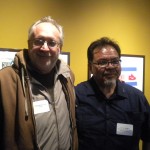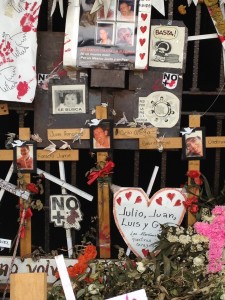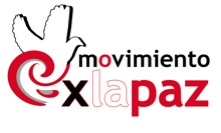 As part of the Voices of Victims tour, foreign policy writer Laura Carlsen and member of the Victims Platform of the Movement for Peace with Justice and Dignity and human rights defender Araceli Rodríguez paired up for a Southwest tour through Colorado, New Mexico and Arizona, October 23-November 5, 2013.
As part of the Voices of Victims tour, foreign policy writer Laura Carlsen and member of the Victims Platform of the Movement for Peace with Justice and Dignity and human rights defender Araceli Rodríguez paired up for a Southwest tour through Colorado, New Mexico and Arizona, October 23-November 5, 2013.
Laura Carlsen is the director of the Americas Program of the Center for International Policy in Mexico City and a leading voice against the U.S.-sponsored drug war in Mexico. Araceli Rodríguez’s son Luis Angel León, a federal police officer, was forcibly disappeared four years ago. Her quest to find out what happened to him and attain justice in the case led her to become a founding member of the Movement for Peace with Justice and Dignity. Since then she has traveled throughout Mexico and the United States, as a spokesperson for the Victims’ Platform, demanding justice and an end to the drug war that took her son’s life.
Within the war on drugs, women have too often been the invisible victims. Although they make up a smaller percentage of the homicide victims, they are the majority of those who seek justice for the murdered and the disappeared, at times risking their own lives. Araceli has been granted protective measures due to threats against her life and her efforts to find out the truth about how her son was murdered on official duty have led her to face members of organized crime and government alike.
Below is Laura’s brief chronicle of the women’s part of the Voices of Victims tour.
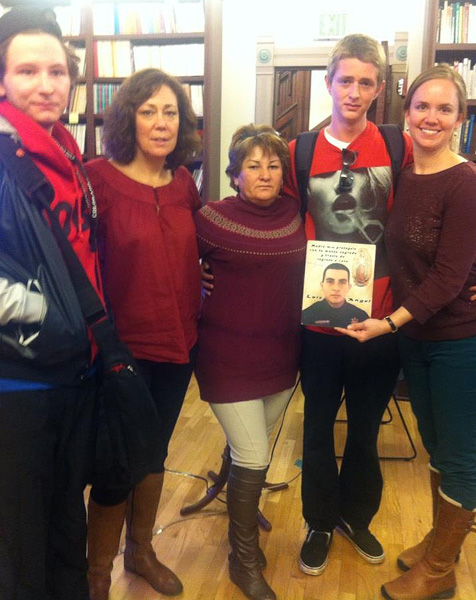
Araceli (middle) and Laura (second from left)
We decided to pair up for a series of public events to raise awareness of the cost of U.S. foreign policy in supporting the drug war in Mexico.
Because we are directly affected and we work with women victims and defenders, we focused on an often-overlooked theme: the role of women and the links between drug war violence and violation of women’s rights. Our presentations and slides showed the correlation between the drug war and an alarming rise in femicides, how a patriarchal and militarist strategy threatens democracy and women’s rights, and women’s roles in leading movements for peace and justice despite continued discrimination that often prevents them from taking full leadership positions. Araceli’s recounting her personal path from victim after losing her son to human rights defender, a path followed by many women throughout the country, created an instant bond with audiences throughout the tour.
We also did several talks bringing together that experience with a major problem affecting families and communities in the border region–the government persecution of immigrants.
We began our tour October 23 in Denver at the Drug Policy Alliance conference, where Araceli and I spoke on specific panels and workshops on migration, women, victims, and Mexico. The conference provided a great forum for getting to know other women working against the violence of the drug war. Among the most moving moments was when we heard the stories of African-American women who have lost part of their own lives or lost their children to prison or violence. At the same time, seeing their courageous efforts to change the system gave us heart and they too immediately felt the kinship of suffering when learning of the violence of Mexico’s drug war. We will be working to deepen these ties and bind our struggles in the future.
We talked about how it’s the women who are make up the backbone of our movements–how our roles as mothers in part is what leads us to become human rights defenders and how the war affects not only victims but the fabric of society that women play such a prominent role in weaving: community, family and raising and protecting children, livelihoods, health and justice. We shared stories of how militarization and police repression as a response to crime endanger us, rather than guarantee our safety, and the need to end prohibition to unwind the punitive system and defund the cartels.
On October 24, we drove up on a classic Colorado fall day to the University of Colorado at Boulder, where Women and Gender Studies and Latin American Studies co-sponsored a class presentation and our talk “War on Drugs, War on Women”. Combining testimonies with analysis, we discussed the impact of the war on women and their families. In the packed presentation we discovered not only enormous sympathy among listeners, but also victims, reminding us that the US and Mexico are linked by both solidarity and violence. Along the way, we met many refugees of the violence who began to question the U.S. role in Mexico’s suffering.

Araceli at the Garden of the Gods Park
On the way out of Denver, we stopped at Garden of the Gods Park and took a late afternoon walk among the red rocks. Natural beauty is a salve for the soul and taking time out for friendship and recreation helps keep activism sustainable.
The next day, we stopped for a meeting with Northern Command in Colorado Springs, where we asked some tough questions about why the Pentagon is training Mexican Army personnel in Iraq-style anti-terrorism methods and what they think about the results of the drug war.
In Santa Fe, New Mexico we spent a day with Jim and Suzanne Gollin of the Angelica Foundation, a partner on the Tour, before moving on to Albuquerque at the University of New Mexico Oct. 30 for the public event “War on Women: US-Backed Drug Wars in Mexico and Central America”, sponsored by Latin American and Iberian Studies. Later we had a meeting with a member of our partner organization, Law Enforcement Against Prohibition (LEAP).
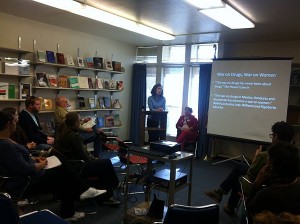
Araceli and Laura (both right) at the Drug Policy Alliance conference
Driving south to Las Cruces, we spoke to a packed room at the public event “Drug War and Human Insecurity in the Borderland”, sponsored by the Center for Latin American and Border Studies of New Mexico State University. The university has strong ties to Mexico and has been a leader in research on conflict and the drug war. From there we turned west to Tucson where again the subject was the border, at the event “Drug wars, Detentions, Death: National Security and Human Insecurity in the US/Mexico Borderlands”, organized by the Center for Latin American Studies/Binational Migration Institute. We later met with students and faculty of the university at a luncheon to establish lasting ties between our movements and programs.
Also in Tucson, at the “Tear Down the Walls” conference we spoke to activists from around the U.S. and met up again with Javier Sicilia and the other part of the tour. The conference brought together anti-prison, immigrant rights, foreign policy reform and social change movements in an on-going discussion on coordinating actions
From there we left to do a presentation at Arizona State University called “America’s Drug Wars: Just Say No”, once again combining a discussion of how and why the U.S. government has supported the drug war, its impact and stories and personal testimony.
Araceli flew back to Mexico Nov. 5 and I went on to do a presentation organized by the University of Carolina and Duke University and community event in Chapel Hill, and to Washington D.C. where, once again, the two legs of the tour converged at a packed briefing in Congress organized by the Mesoamerican Working Group, which the Americas Program co-founded recently. We also met with White House Advisers Juan Gonzalez and Ricardo Zuniga to discuss the violence and human rights violations of the drug war and how this contradicts stated US foreign policy objectives. We emphasized the need for reforms in our drug policy and foreign policy, guaranteeing respect for human rights, the Ahuas massacre in which the DEA and State Department were involved in Honduras and with our partner, JASS, brought up the specific risks to women.
On the women’s voices part of the tour we met and spoke to a few thousand attendees including students, researchers, activists and academics. We gained a better understanding of our common ground and how we can support each other’s organizing. By far the most important aspect of the tour was the human connections made, which will serve as the basis for building our movements far into the future.
For more updates about the Voices of Victims tour, see our updates from the road on our People-to-People blog.

